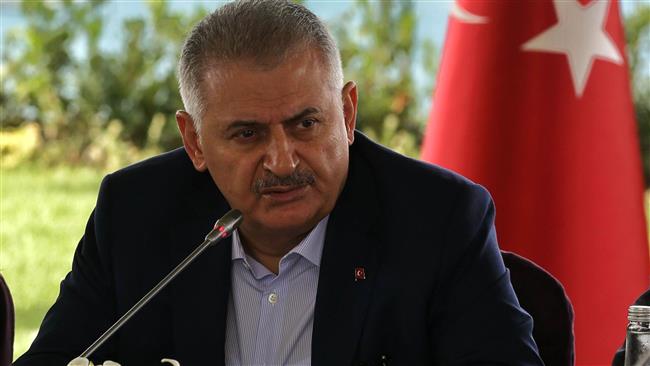
RNA - Speaking on Monday, Turkish Prime Minister Binali Yildirim said, “It is vital that, without losing more time, a new page is opened in Syria.”
Such a revised outlook has to be “based on a model involving particularly Turkey, Iran… Russia, the United States and even some [Persian] Gulf states and Saudi Arabia.”
From the belly of the West to the bosom of the East?
Turkey, along with the US and the Arab dictatorships of the Persian Gulf, has been supporting the militants fighting the elected Syrian government. Recently, however, and amid newly emerged differences with the West, Turkey has been gravitating toward Russia, which supports the Damascus government.
Turkish President Recep Tayyip Erdogan recently met with his Russian counterpart Vladimir Putin in Moscow, and called for a “clean slate” in the bilateral ties, which had been soured by Turkish military’s downing of a Russian jet over Syria last year.
Ankara has also enhanced its ties with Iran following a failed coup in Turkey, which Iran became the first country to condemn. Iran, too, has consistently emphasized that the government of Syrian President Bashar al-Assad is the sole legitimate entity to run Syria.
Turkish Foreign Minister Mevlut Cavusoglu last week made an unannounced visit to Iran, discussing with Iranian officials a range of issues, including the Syrian conflict. Foreign Minister Javad Zarif of Iran had earlier visited Turkey following the coup bid.
On Monday, Iranian Foreign Ministry Spokesman Bahram Qassemi implied that the viewpoints of Iran and Turkey may be converging on issues of disagreement. One such issue may be the Syrian conflict.
Speaking on Monday, Turkish Prime Minister Binali Yildirim said, “It is vital that, without losing more time, a new page is opened in Syria.”
Such a revised outlook has to be “based on a model involving particularly Turkey, Iran… Russia, the United States and even some [Persian] Gulf states and Saudi Arabia.”
From the belly of the West to the bosom of the East?
Turkey, along with the US and the Arab dictatorships of the Persian Gulf, has been supporting the militants fighting the elected Syrian government. Recently, however, and amid newly emerged differences with the West, Turkey has been gravitating toward Russia, which supports the Damascus government.
Turkish President Recep Tayyip Erdogan recently met with his Russian counterpart Vladimir Putin in Moscow, and called for a “clean slate” in the bilateral ties, which had been soured by Turkish military’s downing of a Russian jet over Syria last year.
Ankara has also enhanced its ties with Iran following a failed coup in Turkey, which Iran became the first country to condemn. Iran, too, has consistently emphasized that the government of Syrian President Bashar al-Assad is the sole legitimate entity to run Syria.
Turkish Foreign Minister Mevlut Cavusoglu last week made an unannounced visit to Iran, discussing with Iranian officials a range of issues, including the Syrian conflict. Foreign Minister Javad Zarif of Iran had earlier visited Turkey following the coup bid.
On Monday, Iranian Foreign Ministry Spokesman Bahram Qassemi implied that the viewpoints of Iran and Turkey may be converging on issues of disagreement. One such issue may be the Syrian conflict.
111/847/C